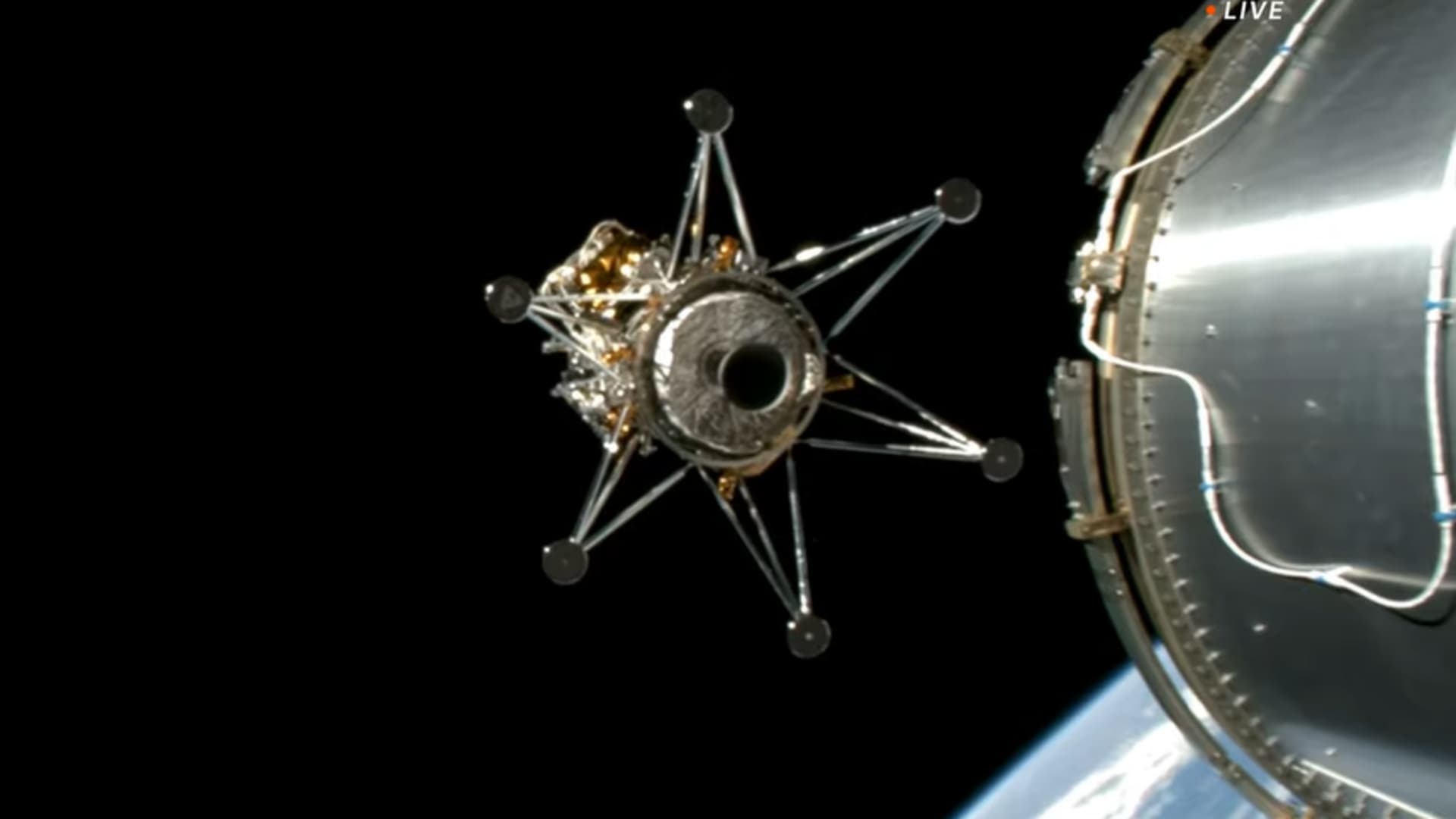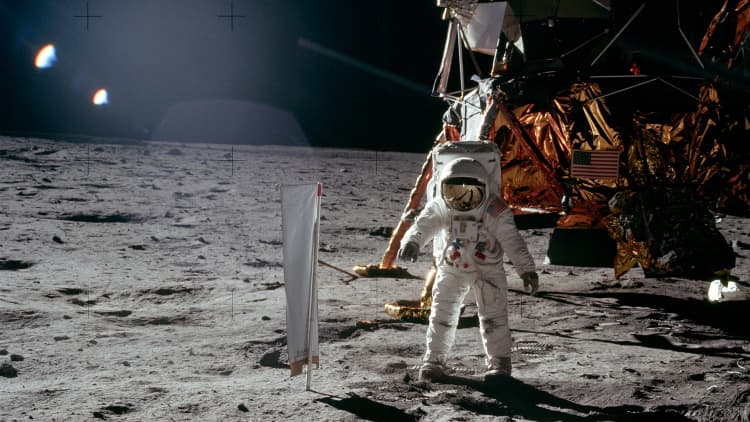
Intuitive Machines’ Nova-C lander “Odysseus” deploys from the upper stage of SpaceX’s Falcon 9 rocket to begin the IM-1 mission.
NASA TV
Much like Intuitive Machines’ spacecraft, its stock has been flying to the moon the past week.
In a little over a month since hitting all-time lows, and with its IM-1 mission on the way to the lunar surface, shares of Intuitive Machines have climbed more than 300% since early January. It’s a rally that Wall Street analysts describe as fueled by retail investors’ excitement for the space company’s progress toward an unprecedented goal.
The Texas-based lunar company’s stock, with the apt ticker of “LUNR,” now trades for about $9 per share, a far cry from January lows of closer to $2. At one point this week, as IM-1 progressed through milestones ahead of its landing attempt — the stock reached over $13 in trading.
“We’ve never witnessed a publicly traded company go through [a moon landing attempt]. So this is new, not just for investors, but for us analysts as well,” Cantor Fitzgerald’s Andres Sheppard told CNBC.
Sheppard compared Intuitive Machine’s landing attempt, expected late Thursday, to a biotech company waiting on a FDA approval for a new drug: “It’s a bit of a binary outcome,” Sheppard said.
While Sheppard said he could see Intuitive’s stock price climbing to near $15 a share if the landing is successful, he cautioned that a last-minute mishap could drag the stock down.
And in the event of a further surge, he noted, “that valuation is certainly ahead of the company’s financials” — as “people are getting caught up” in the excitement and potential history of IM-1 landing on the moon, he said.

Intuitive Machines stock trading around its IM-1 moon mission.
Intuitive went public via a SPAC merger less than a year ago, and has spent most of that time trading below its debut pricing. Only a handful of Wall Street analysts cover the $1 billion space company. Of the firms listed by FactSet as covering Intuitive Machines, all four analysts have buy equivalent ratings on the stock – and all four have seen the stock blow past their pre-launch price targets.
Beyond the technological and financial progress IM-1 represents for Intuitive Machines, analysts pointed to the enthusiasm for what may be the first U.S. landing on the moon in over 50 years, as well as the first by a corporate entity, rather than a government agency.
“We get to see how these applications in space can capture the imagination and vision of investors … hopefully it is successful, as I think that will do a lot for the space industry as a whole,” Benchmark analyst Josh Sullivan told CNBC.
Along with Canaccord Genuity analyst Austin Moeller, Sullivan and Sheppard were unanimous in their reads that retail, not institutional, investors are driving the current Intuitive Machines’ rally. Sheppard said his firm estimates about 80% of trading over the past week was done by retail traders.
“There’s huge momentum being driven by the retail community behind this,” Sheppard said.
Sullivan also cited the global news coverage of Intuitive’s mission as another driver, giving the company a wider exposure.
“The successful milestones are adding up to a point where [a moon company] is becoming a commercial reality, and I think that’s starting to catch on,” Sullivan said.
Passing milestones
IM-1 has been making steady progress through the 16 milestones the company outlined before the launch. Yet Intuitive is not just clearing the technological hurdles that come with a first spaceflight, but also checking boxes to get paid by its biggest customer – before even attempting the landing.
Intuitive Machines and NASA leaders showcase a mockup of the company’s Nova-C lunar lander during a presentation on May 31, 2019.
Aubrey Gemignani / NASA
Canaccord’s Moeller noted that IM-1 has now achieved more than 90% of the milestones required for payment under its $118 million contract with NASA. The remaining payment milestones include landing safely and successfully collecting data from the research on board the spacecraft.
But, as Sullivan noted, IM-1 represents more than just getting paid for an existing contract.
“It is really about proving a track record of success in the very harsh environment of space, so that in the future when they’re going to NASA … the likelihood of them winning those very large contracts increases pretty substantially,” Sullivan said.
A key element of NASA’s Commercial Lunar Payload Services (CLPS) program is the competitive nature between companies bidding to deliver cargo on future moon missions. One of Intuitive Machines’ competitors, Astrobotic, had a crippling problem during its inaugural moon mission last month that kept the company from attempting a landing.
Both companies, as well as others, have already won NASA contracts for additional missions. Analysts see Intuitive’s progress thus far as a key differentiator in future bids.
“Even if the mission isn’t successful [in landing], they have two additional missions that are already under contract. The next one’s supposed to launch in a few months and they’ll be able to take the the data and the learnings from this mission, which has been pretty successful so far, and apply that,” Moeller said.

